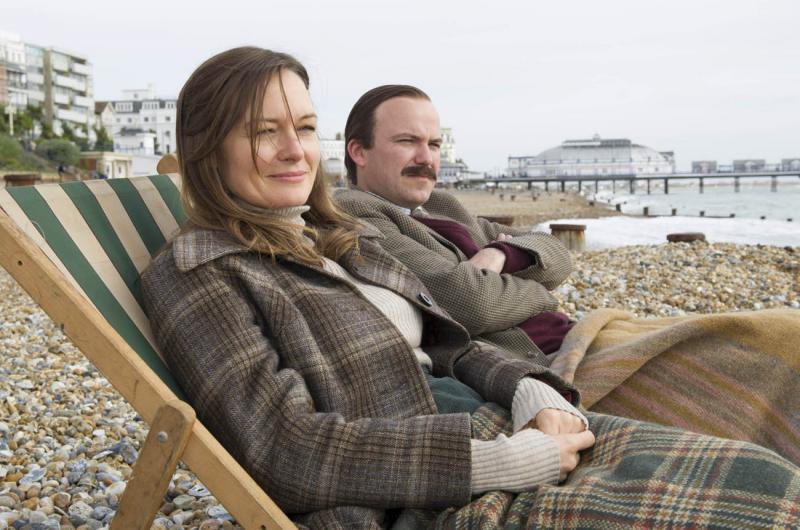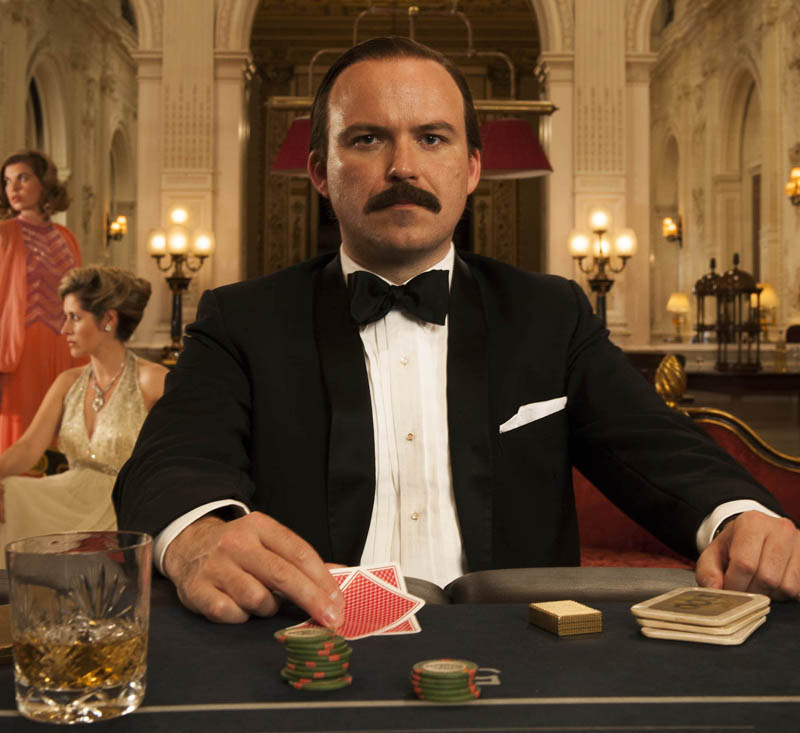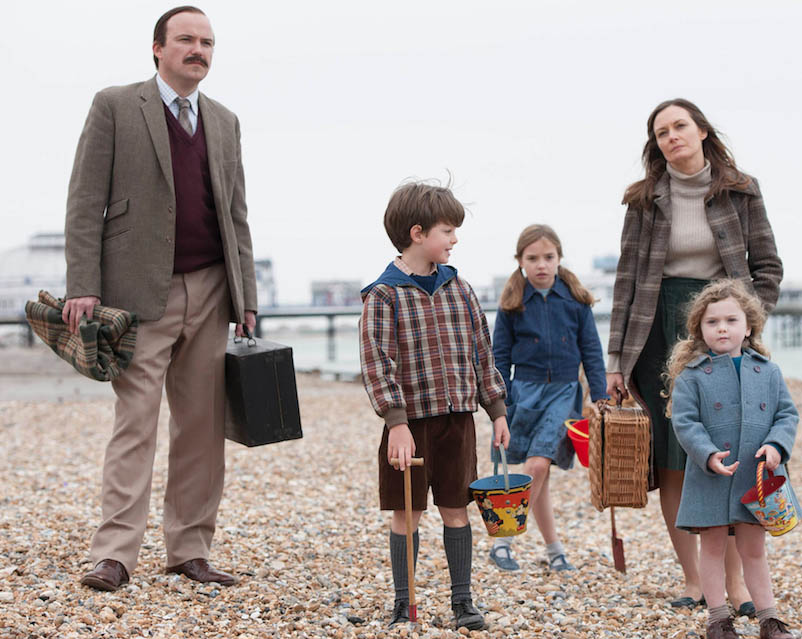Lucan, ITV | reviews, news & interviews
Lucan, ITV
Lucan, ITV
Murder and moral squalor in the playgrounds of the aristocracy

The disappearance of Lord “Lucky” Lucan in 1974 remains one of the most teasing enigmas of recent-ish history. Following the collapse of his marriage and a bitter battle with his wife Veronica for custody of their three children, the gambling addict Lucan is presumed to have battered the children’s nanny to death, attacked his wife, then fled the country by boat from Newhaven. Elvis-like sightings of the disgraced peer have poured in from around the world ever since.
This TV version of the story (it concludes next week), adapted by Jeff Pope from John Pearson’s book The Gamblers, uses the story of Pearson’s authorly research as a framework. Pearson (Paul Freeman) is seen musing over his typewriter and tracking down friends and witnesses from Lucan’s repulsive milieu of affectless, supercilious aristocrats as he tries to unpick the riddle. He unravels chunks of the story, but then the self-protective shutters come down, as the likes of Suzie Maxwell-Scott (a cobwebby Jane Lapotaire) close ranks and pull up the ancestral drawbridge (Lucan in his element, pictured below).
 The obvious flaw in the conception of the piece is that the real answers aren’t known, so that what we’re watching is a hypothesis built on some unfinished foundations of fact. But viewed simply as drama, it’s fascinating enough, in a morbid, downbeat kind of way. If you were sitting in the pub tossing around potential names of actors to play Lucan, it would probably take you a few large ones before you got to Rory Kinnear. Lucan was, according to Wikipedia, “once considered for the role of James Bond”, which one senses Kinnear possibly hasn’t been. It’s a mark of what a fine actor he is, then, that he has created a compelling portrait of a dry, emotionally stunted Lucan, a man who demands complete control in his family life but who signally lacks it when confronted with the lure of the gaming tables.
The obvious flaw in the conception of the piece is that the real answers aren’t known, so that what we’re watching is a hypothesis built on some unfinished foundations of fact. But viewed simply as drama, it’s fascinating enough, in a morbid, downbeat kind of way. If you were sitting in the pub tossing around potential names of actors to play Lucan, it would probably take you a few large ones before you got to Rory Kinnear. Lucan was, according to Wikipedia, “once considered for the role of James Bond”, which one senses Kinnear possibly hasn’t been. It’s a mark of what a fine actor he is, then, that he has created a compelling portrait of a dry, emotionally stunted Lucan, a man who demands complete control in his family life but who signally lacks it when confronted with the lure of the gaming tables.
Kinnear also imparts the sense that his Lucan is not especially bright - for instance, he considers gambling to be his career, despite the fact that he always loses and is bankrupt. It’s left to his close friend John Aspinall, unscrupulous gambling magnate and creator of the toffs’ Mayfair playground the Clermont Club, to apply piercingly chilled logic to the question of how Lucan can rid himself of his wife (the Lucan clan hit the beach, pictured below).
 As Aspinall, Christopher Eccleston is seriously intimidating, reducing potential murder to a simple case of genetic desirability. Also a pioneering zoo-owner, Aspinall is fascinated with apes and the dominant role of the alpha male. Should he decide to murder his wife, Aspinall reasons to Lucan, “you would of course be free to breed again and increase your bloodstock.” Bearing the brunt of Lucan’s detachment and warped self-image is Catherine McCormack’s Lady Veronica, eager to be a good wife and mother and unable to comprehend her husband’s self-destructive trajectory. Understandably, she was stressed out and prone to tearful outbursts, to which loveable Lucky responded by dropping her off at a psychiatric hospital and trying (unsuccessfully) to have her committed.
As Aspinall, Christopher Eccleston is seriously intimidating, reducing potential murder to a simple case of genetic desirability. Also a pioneering zoo-owner, Aspinall is fascinated with apes and the dominant role of the alpha male. Should he decide to murder his wife, Aspinall reasons to Lucan, “you would of course be free to breed again and increase your bloodstock.” Bearing the brunt of Lucan’s detachment and warped self-image is Catherine McCormack’s Lady Veronica, eager to be a good wife and mother and unable to comprehend her husband’s self-destructive trajectory. Understandably, she was stressed out and prone to tearful outbursts, to which loveable Lucky responded by dropping her off at a psychiatric hospital and trying (unsuccessfully) to have her committed.
McCormack’s performance triggers pangs of empathy, which is just as well since everybody else in the cast is either utterly repellent or wholly despicable. It’s enough to give Britain’s top people a bad name.
rating
Explore topics
Share this article
Add comment
The future of Arts Journalism
You can stop theartsdesk.com closing!
We urgently need financing to survive. Our fundraising drive has thus far raised £49,000 but we need to reach £100,000 or we will be forced to close. Please contribute here: https://gofund.me/c3f6033d
And if you can forward this information to anyone who might assist, we’d be grateful.

Subscribe to theartsdesk.com
Thank you for continuing to read our work on theartsdesk.com. For unlimited access to every article in its entirety, including our archive of more than 15,000 pieces, we're asking for £5 per month or £40 per year. We feel it's a very good deal, and hope you do too.
To take a subscription now simply click here.
And if you're looking for that extra gift for a friend or family member, why not treat them to a theartsdesk.com gift subscription?
more TV
 Coldwater, ITV1 review - horror and black comedy in the Highlands
Superb cast lights up David Ireland's cunning thriller
Coldwater, ITV1 review - horror and black comedy in the Highlands
Superb cast lights up David Ireland's cunning thriller
 Blu-ray: The Sweeney - Series One
Influential and entertaining 1970s police drama, handsomely restored
Blu-ray: The Sweeney - Series One
Influential and entertaining 1970s police drama, handsomely restored
 I Fought the Law, ITVX review - how an 800-year-old law was challenged and changed
Sheridan Smith's raw performance dominates ITV's new docudrama about injustice
I Fought the Law, ITVX review - how an 800-year-old law was challenged and changed
Sheridan Smith's raw performance dominates ITV's new docudrama about injustice
 The Paper, Sky Max review - a spinoff of the US Office worth waiting 20 years for
Perfectly judged recycling of the original's key elements, with a star turn at its heart
The Paper, Sky Max review - a spinoff of the US Office worth waiting 20 years for
Perfectly judged recycling of the original's key elements, with a star turn at its heart
 The Guest, BBC One review - be careful what you wish for
A terrific Eve Myles stars in addictive Welsh mystery
The Guest, BBC One review - be careful what you wish for
A terrific Eve Myles stars in addictive Welsh mystery
 theartsdesk Q&A: Suranne Jones on 'Hostage', power pants and politics
The star and producer talks about taking on the role of Prime Minister, wearing high heels and living in the public eye
theartsdesk Q&A: Suranne Jones on 'Hostage', power pants and politics
The star and producer talks about taking on the role of Prime Minister, wearing high heels and living in the public eye
 King & Conqueror, BBC One review - not many kicks in 1066
Turgid medieval drama leaves viewers in the dark
King & Conqueror, BBC One review - not many kicks in 1066
Turgid medieval drama leaves viewers in the dark
 Hostage, Netflix review - entente not-too-cordiale
Suranne Jones and Julie Delpy cross swords in confused political drama
Hostage, Netflix review - entente not-too-cordiale
Suranne Jones and Julie Delpy cross swords in confused political drama
 In Flight, Channel 4 review - drugs, thugs and Bulgarian gangsters
Katherine Kelly's flight attendant is battling a sea of troubles
In Flight, Channel 4 review - drugs, thugs and Bulgarian gangsters
Katherine Kelly's flight attendant is battling a sea of troubles
 Alien: Earth, Disney+ review - was this interstellar journey really necessary?
Noah Hawley's lavish sci-fi series brings Ridley Scott's monster back home
Alien: Earth, Disney+ review - was this interstellar journey really necessary?
Noah Hawley's lavish sci-fi series brings Ridley Scott's monster back home
 The Count of Monte Cristo, U&Drama review - silly telly for the silly season
Umpteenth incarnation of the Alexandre Dumas novel is no better than it should be
The Count of Monte Cristo, U&Drama review - silly telly for the silly season
Umpteenth incarnation of the Alexandre Dumas novel is no better than it should be
 The Narrow Road to the Deep North, BBC One review - love, death and hell on the Burma railway
Richard Flanagan's prize-winning novel becomes a gruelling TV series
The Narrow Road to the Deep North, BBC One review - love, death and hell on the Burma railway
Richard Flanagan's prize-winning novel becomes a gruelling TV series

Comments
Brilliant factual drama